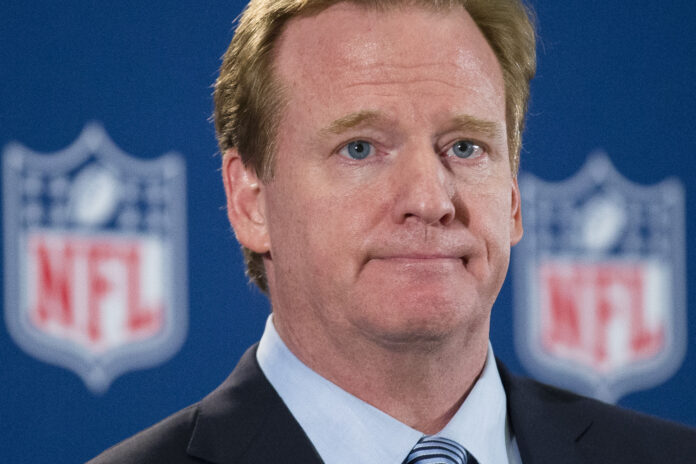Coach Bill Belichick’s constant reminders to the team often centered on saying, “Sweating doesn’t equate to work.”
He emphasized that actual work involves accomplishing meaningful tasks, distinguishing it from physical activity children engage in. Work meant the completion of essential tasks.
This perspective resonates with the 2014 fall NFL owners meetings that transpired over two days in New York, culminating on Thursday.
The spotlight at this typically uneventful annual gathering, apart from the approval of Terry and Kim Pegula as the new owners of the Buffalo Bills, fell on Commissioner Roger Goodell.
Despite his title as “commissioner,” many, including present observers, yearned to clarify Goodell’s genuine accountability as the NFL owners’ representative.
The buzzwords of ‘new policy’ and ‘enhanced education,’ among others, were casually thrown into discussions.
However, a pertinent question loomed: “What actions will be taken concerning Roger Goodell, the brand manager, to hold him responsible for steering the NFL brand into an entirely avoidable public debacle?”
Is there a plan in place? Or is the response merely an endorsement of Goodell’s performance? In the latter case, it essentially equates to exerting physical effort and claiming it as meaningful work.
For those who share the widespread frustration within the NFL fanbase and seek insight into how Roger Goodell can evade accountability in a manner he would not tolerate from others, a quote from a beloved MBA professor at Babson College encapsulates the essence.
Les Charm’s emphatic message echoed: “If there’s one key takeaway from my class, it’s this—TERMS, TERMS, TERMS!” Charm’s teaching revolved around the notion that, in business, the terms of an agreement are the most pivotal determinants of success or conflict.
Everything else pales in comparison to the extent that ‘terms’ are the second and third most critical factors in any scenario.
The NFL is made up of 32 separate interests, playing and answering to 32 different markets. It’s foolish to believe that 32 owners think Goodell is doing an aw-shucks, bang-up job.
Amidst the overwhelming consensus from various quarters of the world that Roger Goodell should face immediate repercussions for his subpar performance in his role, the absence of such consequences does not indicate a unanimous endorsement of his actions by all NFL owners.
The real issue lies in their agreement with Goodell, which does not provide the necessary support for the punitive measures that many believe he rightfully deserves.
The substantial compensation they offer Goodell is meant to safeguard against situations like the one where he mishandled the league’s affairs, leading to a considerable public relations fiasco.
Interpreting the unified front of the 32 owners, who may appear to be singing praises of Goodell while clenching their teeth, is more accurately a reflection of the recognition that the agreement’s terms, or their intentional ambiguity, make pursuing disciplinary actions a risky endeavor.
Reaching unanimity among 32 individuals on any matter is an exceedingly challenging feat. It’s a well-known adage that proclaiming unanimity often indicates its absence. This notion holds within the NFL, a conglomerate of 32 distinct interests, each operating in unique markets.
It would be unwise to assume that every owner genuinely believes Goodell performs commendably. Their primary concern is the NFL brand’s sustainability, directly impacting their franchises and profitability.
Having the figurehead of this brand widely reviled is detrimental to all parties involved.
Former teammate and linebacker Tedy Bruschi encapsulated this sentiment aptly during an appearance on WEEI radio in Boston following Goodell’s recent lackluster press conference:
“We need a new leader to implement new policies and to have a new image. Because in the future, when you look to the NFL and you see the head of the NFL, and it is Roger Goodell, no matter what happens with the investigation, you remember and you wonder. You wonder what he’s saying. Is he telling the truth?”
“Roger Goodell’s integrity has been compromised.”
This viewpoint resonates with many, and it’s highly improbable that among a group of 32 astute businesspersons, there aren’t those who share this clarity of thought. Their primary objective is to safeguard and enhance their brand.
Having an individual responsible for upholding the league’s integrity whose own integrity is under widespread scrutiny and remains unaddressed is undeniably detrimental to the brand’s well-being. This is an irrefutable fact.
Tedy Bruschi recently on WEEI: “Roger Goodell’s integrity has been compromised.”
The reluctance of NFL owners to take immediate corrective action for the sake of the NFL brand can be traced back to the contractual terms that govern such decisions. This is analogous to why underperforming players are not swiftly released; contractual obligations drive these determinations.
For an NFL player, the fundamental financial terms of their contract are common knowledge. The clauses detailing potential penalties and disciplinary actions are also made public through the standard duration in every player’s contract, thanks to the collective bargaining agreement.
However, the situation drastically differs for the NFL commissioner. Transparency at that level remains lacking, and perhaps, considering recent events, it’s an aspect that deserves reconsideration.
Suppose the outright removal, suspension, or fining of Roger Goodell is not feasible without additional information. In that case, it appears that the NFL has regressed to a position reminiscent of its prior lapses in judgment.
The initial leniency in the Ray Rice case, based on incomplete evidence and a lack of managerial resolve to make the right decision, serves as a stark reminder.
It took the public exposure of a video to compel the league to carry out the appropriate course of action. Isn’t the NFL repeating the same pattern in handling its underperforming commissioner?
The current scenario leaves everyone waiting for an ostensibly independent investigation to conclude, although the term “independent” might raise some eyebrows.
The question lingers is whether the embarrassment must reach a critical threshold before the league is compelled to act. Must they wait until it becomes publicly embarrassing enough to prompt action?
It’s perplexing how a multi-billion dollar business can repeatedly find itself caught in slow-moving crises, almost resembling a comical scene from an Austin Powers movie.
The cycle of waiting for embarrassment to force decisive action appears baffling in a corporate setting of this magnitude.
When an agenda brims with various items, yet none of them addresses the glaring brand issue of hypocrisy, there emerges a pressing need for someone to exercise astute judgment.
The forthcoming media attention accompanying the release of the investigation results promises to be far from sympathetic. It’s poised to either scrutinize the integrity of the brand’s leader or cast doubt on the integrity of the investigation itself.
This presents a lose-lose scenario if proactive measures aren’t taken.
And that’s merely the beginning. The highly predictable aftermath of this entire episode is that the first player with substantial influence, fined for any debatable action, will publicly confront the commissioner for not adhering to the very rules he enforces. The days of “Because I said so” no longer suffice.
This issue is destined to dominate headlines, reoccurring with each similar incident. The NFL brand’s integrity will continue to suffer.
Why does the NFL grapple with a domestic violence problem? It’s not due to the actions of a few among its thousands of employees. Instead, the NFL’s domestic violence problem stems from its expansion under the purview of a bumbling league management led by Commissioner Roger Goodell.
It seems that the much-needed resolve to make the right choices isn’t emerging from the ranks of NFL ownership.
What must occur is an adjustment in the terms of Goodell’s deal, as well as those of any future commissioner, to ensure that integrity regains its rightful place at the table currently occupied by hypocrisy.
If you mismanage the brand to the point where it garners negative headlines, you should bear the consequences, as you must prevent such occurrences. It’s a fairly straightforward concept.
Collective ownership possesses the leverage to institute these terms. Behind closed doors, Goodell should be compelled to accept a public penalty, even if it contradicts the provisions of his existing contract.
This penalty should be deemed necessary if he wishes to secure his future employment and compensation. To stave off the impending deluge that inaction guarantees, this action must be taken before the investigation results are revealed.
Goodell should be obligated to place his penalty on the line to quell the public doubts about his integrity. While domestic violence initially plagued the NFL’s image, it has now been overshadowed by widespread mistrust of the commissioner.
The time for action is now, for the choice is clear: either deliver results or find someone who will.

